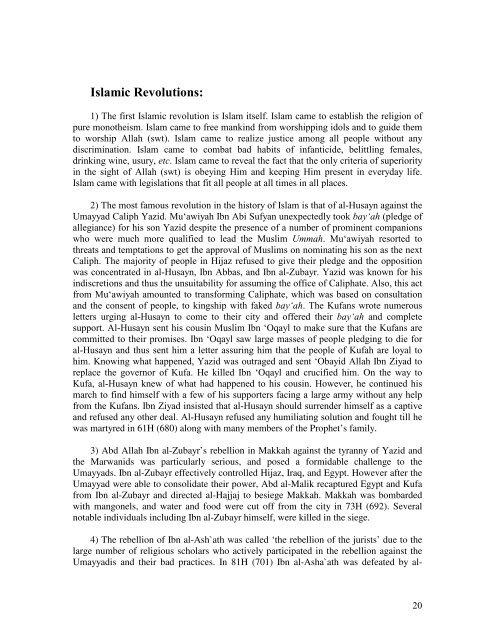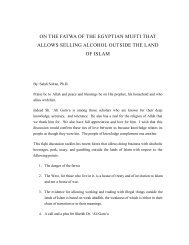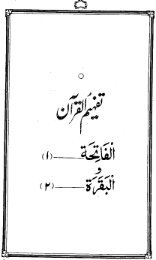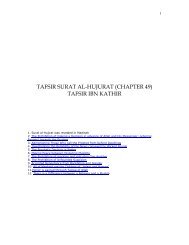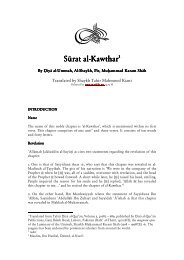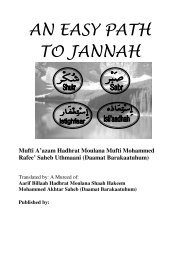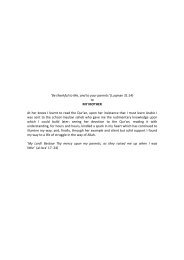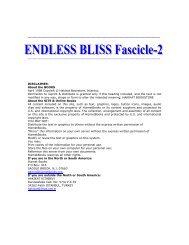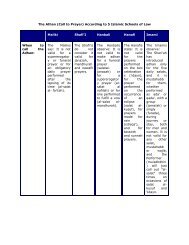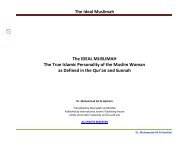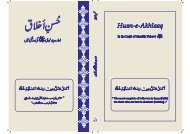Rebellion and Civil Disobedience in Islam The Need for a Paradigm ...
Rebellion and Civil Disobedience in Islam The Need for a Paradigm ...
Rebellion and Civil Disobedience in Islam The Need for a Paradigm ...
You also want an ePaper? Increase the reach of your titles
YUMPU automatically turns print PDFs into web optimized ePapers that Google loves.
<strong>Islam</strong>ic Revolutions:1) <strong>The</strong> first <strong>Islam</strong>ic revolution is <strong>Islam</strong> itself. <strong>Islam</strong> came to establish the religion ofpure monotheism. <strong>Islam</strong> came to free mank<strong>in</strong>d from worshipp<strong>in</strong>g idols <strong>and</strong> to guide themto worship Allah (swt). <strong>Islam</strong> came to realize justice among all people without anydiscrim<strong>in</strong>ation. <strong>Islam</strong> came to combat bad habits of <strong>in</strong>fanticide, belittl<strong>in</strong>g females,dr<strong>in</strong>k<strong>in</strong>g w<strong>in</strong>e, usury, etc. <strong>Islam</strong> came to reveal the fact that the only criteria of superiority<strong>in</strong> the sight of Allah (swt) is obey<strong>in</strong>g Him <strong>and</strong> keep<strong>in</strong>g Him present <strong>in</strong> everyday life.<strong>Islam</strong> came with legislations that fit all people at all times <strong>in</strong> all places.2) <strong>The</strong> most famous revolution <strong>in</strong> the history of <strong>Islam</strong> is that of al-Husayn aga<strong>in</strong>st theUmayyad Caliph Yazid. Mu‘awiyah Ibn Abi Sufyan unexpectedly took bay‘ah (pledge ofallegiance) <strong>for</strong> his son Yazid despite the presence of a number of prom<strong>in</strong>ent companionswho were much more qualified to lead the Muslim Ummah. Mu‘awiyah resorted tothreats <strong>and</strong> temptations to get the approval of Muslims on nom<strong>in</strong>at<strong>in</strong>g his son as the nextCaliph. <strong>The</strong> majority of people <strong>in</strong> Hijaz refused to give their pledge <strong>and</strong> the oppositionwas concentrated <strong>in</strong> al-Husayn, Ibn Abbas, <strong>and</strong> Ibn al-Zubayr. Yazid was known <strong>for</strong> his<strong>in</strong>discretions <strong>and</strong> thus the unsuitability <strong>for</strong> assum<strong>in</strong>g the office of Caliphate. Also, this actfrom Mu‘awiyah amounted to trans<strong>for</strong>m<strong>in</strong>g Caliphate, which was based on consultation<strong>and</strong> the consent of people, to k<strong>in</strong>gship with faked bay‘ah. <strong>The</strong> Kufans wrote numerousletters urg<strong>in</strong>g al-Husayn to come to their city <strong>and</strong> offered their bay‘ah <strong>and</strong> completesupport. Al-Husayn sent his cous<strong>in</strong> Muslim Ibn ‘Oqayl to make sure that the Kufans arecommitted to their promises. Ibn ‘Oqayl saw large masses of people pledg<strong>in</strong>g to die <strong>for</strong>al-Husayn <strong>and</strong> thus sent him a letter assur<strong>in</strong>g him that the people of Kufah are loyal tohim. Know<strong>in</strong>g what happened, Yazid was outraged <strong>and</strong> sent ‘Obayid Allah Ibn Ziyad toreplace the governor of Kufa. He killed Ibn ‘Oqayl <strong>and</strong> crucified him. On the way toKufa, al-Husayn knew of what had happened to his cous<strong>in</strong>. However, he cont<strong>in</strong>ued hismarch to f<strong>in</strong>d himself with a few of his supporters fac<strong>in</strong>g a large army without any helpfrom the Kufans. Ibn Ziyad <strong>in</strong>sisted that al-Husayn should surrender himself as a captive<strong>and</strong> refused any other deal. Al-Husayn refused any humiliat<strong>in</strong>g solution <strong>and</strong> fought till hewas martyred <strong>in</strong> 61H (680) along with many members of the Prophet’s family.3) Abd Allah Ibn al-Zubayr’s rebellion <strong>in</strong> Makkah aga<strong>in</strong>st the tyranny of Yazid <strong>and</strong>the Marwanids was particularly serious, <strong>and</strong> posed a <strong>for</strong>midable challenge to theUmayyads. Ibn al-Zubayr effectively controlled Hijaz, Iraq, <strong>and</strong> Egypt. However after theUmayyad were able to consolidate their power, Abd al-Malik recaptured Egypt <strong>and</strong> Kufafrom Ibn al-Zubayr <strong>and</strong> directed al-Hajjaj to besiege Makkah. Makkah was bombardedwith mangonels, <strong>and</strong> water <strong>and</strong> food were cut off from the city <strong>in</strong> 73H (692). Severalnotable <strong>in</strong>dividuals <strong>in</strong>clud<strong>in</strong>g Ibn al-Zubayr himself, were killed <strong>in</strong> the siege.4) <strong>The</strong> rebellion of Ibn al-Ash`ath was called ‘the rebellion of the jurists’ due to thelarge number of religious scholars who actively participated <strong>in</strong> the rebellion aga<strong>in</strong>st theUmayyadis <strong>and</strong> their bad practices. In 81H (701) Ibn al-Asha`ath was defeated by al-20


